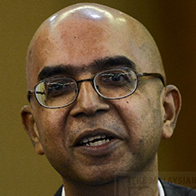 This week, an academic researcher asked me whether Malaysia practises democracy.
This week, an academic researcher asked me whether Malaysia practises democracy.
I said that on a scale of 1 to 4, with 1 being “has some features of a democracy” and 4 being “is a perfect democracy”, I would choose a score of 1.
The main feature of a democracy which Malaysia does have is this: about every five years we vote for leaders of state and federal governments. (We do not elect senators and local councillors.)
Is that a sufficient basis for saying that Malaysia practices democracy?
I would answer that it is not. My answer is based on my understanding of the role of government; access to information; the practicalities of conducting elections and the ability of the public to influence government policies. I’ll explain each one in turn.
The role of government is to restrain those who would resort to violence to obtain their goals; to protect and promote equality and avoid cronyism.
Access to information means the public must be able to know what processes and data were used to design policies, and must be able to know the results of the policies.
Otherwise the public will not be able to scrutinise the effectiveness of government and hold it to account during elections.
The practicalities of conducting elections means the list of eligible voters (“electoral roll”) must be complete and free of errors, the power of a vote must be the same regardless of where the voter lives (“constituencies with approximately equal voters”) and prior voting patterns must not influence the way boundaries are drawn (no “gerrymandering”).
The ability to influence policies is self-explanatory, but I’ll give two examples: who is ignored when deciding how much money to give annually to Islamic authorities? Who is ignored when deciding how many foreign workers should work in Malaysia?
Clearly Malaysia scores poorly in the four areas I have outlined.
Inequality is best demonstrated by the effect of public protests.
At the Umno assembly in December 2015, the government promoted the “Malay red shirts” who were prevented by the police from attacking Kuala Lumpur's Chinatown in September – and wasn’t embarrassed by revelations that the red shirts were government-funded.
During the Umno assembly, the government also demonised the peaceful, self-funded participants of Bersih 4 who called for institutional reforms and for the prime minister to resign over the 2.6 billion ringgit scandal.
By muzzling and vilifying the PM’s critics, the assembly further demonstrated how deeply entrenched cronyism is in Malaysia.
The apex court’s decision in the Allah case is another illustration of inequality.
The court referenced "Muslim" protesters’ threat to violence as a reason for deciding to snuff out, within Malaysia, a global, pre-Islamic practice of Christians – as noted by Islamic scholars, commentators and governments from around the world.
In Malaysia, government-staged protests are used to buttress policy decisions; other protests are demonised. That’s the surest sign of a sham democracy.
Access to information is extremely limited. I’ll note just three: it is near impossible for the public to get national data on the number of crimes committed, the number of deaths in custody and the number of successful prosecutions. This is typical of a police state.
The tragic state of the electoral process is well known, thanks to the string of revelations made by Bersih 2.0, the Coalition for Free and Fair Elections.
We have incomplete and polluted electoral rolls, our constituencies are far from equal sized and we excel in gerrymandering.
The ability to influence policies is unbalanced, as shown by my review of the red shirts, Bersih 4 and the Allah decision.
To this I add the fact that we do not have parliamentary select committees (which hold open hearings and invite contributions).
We have a sham democracy because most citizens don’t know what democracy is.
They don’t know because democracy isn’t part of the school curriculum.
When I was in school from 1965 to 1977, I was taught nothing about democracy. From talking with those who have gone through our schools in subsequent decades, and from talking with teachers, I know democracy is still missing from the school curriculum.
The researcher asked me what Malaysia must introduce in order to be a better democracy. I listed 5 things:
1. Teach democracy in the school curriculum;
2. Enact a national Freedom to Information Act;
3. Appoint a commission comprised of retired Election Commission chiefs of Australia, New Zealand and India to review and reform Malaysia’s Election Commission;
4. Establish select committees in Parliament to allow more people access to influence government policies;
5. Introduce elections for senate and for local councils.
On a scale of 1 to 4, how would you respond to “does Malaysia practise democracy?”
What should political parties include in their manifestos for the next general election? – January 28, 2016.
* This is the personal opinion of the writer or publication and does not necessarily represent the views of The Malaysian Insider.


Comments
Please refrain from nicknames or comments of a racist, sexist, personal, vulgar or derogatory nature, or you may risk being blocked from commenting in our website. We encourage commenters to use their real names as their username. As comments are moderated, they may not appear immediately or even on the same day you posted them. We also reserve the right to delete off-topic comments